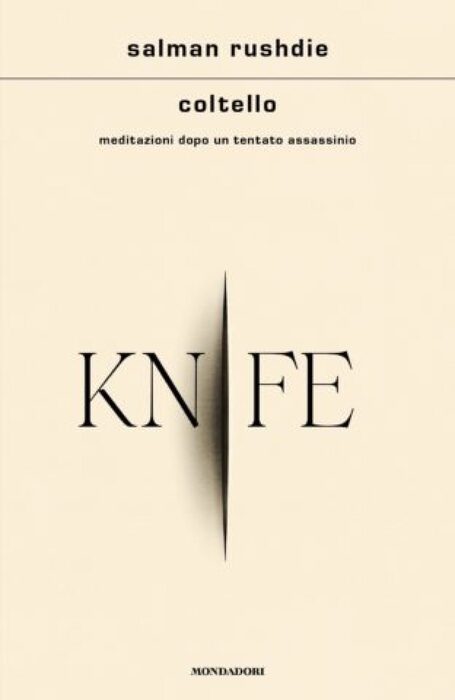The fans have not managed to kill Salman Rushdie this time either.
The first thing we have to admire is his incredible resilience: the consequences of the August 12 attack are yet to be seen, and we can be sure that Rushdie's life will be turned upside down forever, but surviving ten stab wounds - to the neck, to the the liver, in an eye that may lose—is not within everyone's reach.
Rushdie, of course, as everyone knows, had already survived a decade of persecution by a fundamentalist regime whose killers were ubiquitous;
the conditions in which he lived during those years would have shattered another, and it has always seemed miraculous to me that Rushdie not only emerged unharmed from the constant threat, but was able to go on living with anything resembling normality.
I have written “the others”, but the rigorous truth is that this is not the case: not everyone finds it obvious that Rushdie deserves our unconditional support, and there are still those who condone or justify the attacks to which he has been subjected for thirty years.
I am not referring to the fundamentalists, as is evident, nor to the societies that from the outside appear to be democracies but whose mentality is in practice that of a totalitarian system, but to those that Rushdie has called “the but brigades”.
Yes, these militants say, freedom of expression is fine,
but
not if it says what offends me;
yes, I defend freedom of conscience,
but
up to a certain point.
Those voices have accompanied Rushdie since the fatwa of 1989, and it is terrifying to read
Joseph Anton
, the extraordinary book in which Rushdie recounts his most difficult years, and to remember how many writers or journalists - that is, people who live by freedom of expression, or thanks to it - did not consider it unacceptable that a religious figure asked his faithful the murder of a novelist for having put into words an act of imagination.
We have heard these voices everywhere in recent years, and not just in the wake of the
Charlie Hebdo murders.
And I have asked myself: are we facing the same phenomenon as in 1989?
It is possible and worrying to read the attack on Rushdie as the natural result of a new process: the installation among us of an intolerant and inquisitive mentality that does not respond to the fatwa, but is very much of our time.
After all, Rushdie's assailant was born ten years after the publication of
The Satanic Verses.
, and far away - not just literally - from Ayatollah Khomeini's world: his is the world of hate speech turned into a sad routine, of radicalization through social networks, of free debate stifled by fear of cancellation and , above all, of the death threats that anyone launches at anyone with scandalous impunity, and that materialize more frequently than we think.
JK Rowling suffered them last week, without going any further, for rejecting the attack on Rushdie.
"Don't worry, you're next," a certain Meer Asif Aziz wrote on Twitter.
Rowling asked Twitter for support and received this response: "After reviewing the available information, we believe that there are no violations of Twitter's rules in the content you have reported."
In our world, the air in which we express ourselves is increasingly toxic.
It is a world of rampant censorship, a censorship that we have come to accept or to which we have accommodated ourselves because there is no other remedy, and it can be said that freedom of expression, or what we used to designate with these words, has changed its content in our days. : the debate about what can be thought and said is no longer the same, and I will not be the first to suggest, for example, that
The Satanic Verses
would probably not be published today, just as it would not be published (for very different reasons) a novel like
Lolita
.
The most serious thing is that this censorship is no longer exercised by political powers or religious authorities, but by each of the citizens, and both the citizens and the corporations in which we meet —political, economic, whatever—we make decisions about what we say or keep quiet based on the possible controversy and what it may cause: bullying, harassment, cancellation or violence.
In
The Wills Betrayed
, Milan Kundera (one of the most eloquent defenders of
The Satanic Verses
, incidentally) speaks of the novel as the privileged space where we suspend moral judgment.
The morality of the novel, says Kundera, opposes the human custom of judging everyone "instantly, incessantly" and doing so, above all, "before understanding."
"From the point of view of the wisdom of the novel," he continues, "that fervent disposition to judge is the most detestable stupidity, the most pernicious evil."
I've always thought that those words, "fervent disposition to judge," are the closest anyone who wasn't talking about Twitter has come to describing what's happening on Twitter.
This is the atmosphere in which we live today, and there is no telling what deterioration of our freedoms such a state of affairs will lead to.
These days I have remembered the words that Rushdie spoke a few years ago before the Catalan PEN: “Who has the power to tell the stories of our lives and to determine not only which stories can be told, but also how they can be told? How do they have to be counted?
There are obviously stories in which we all live, the history of the culture and language in which we live, the History in which we live, and indeed the ethical structures in which we live, one of which is religion.
Who should have power over these stories?
The freedom to tell our story as we understand or imagine it, and to do so without fear of censorship or attack, is what is at stake.
That is what Rushdie has always defended, even when nobody demanded it anymore,
And no: he hasn't.
It has become known that last Friday, before the attack that almost killed him, Rushdie was preparing to publicly defend the need for the United States to give refuge to Ukrainian writers, and I almost inadvertently remembered that this was how I met him: in a PEN meeting, talking about protecting writers and journalists from the authoritarian and censorious drift of the Chinese government.
Beyond his essays and his public lectures, the images I have of Rushdie are inseparable from that constancy with which he has dedicated himself to defending the ideas in which the rest of us live, especially when that can help others.
He has done it while the world around him has been transformed, but precisely for this reason the brutal attack of which he has been a victim should not only deserve all our repudiation, but also serve as a memorandum:
Juan Gabriel Vasquez
is a writer.
His latest book is
The Peace Disagreements
(Alfaguara).
50% off
Subscribe to continue reading
read without limits
Keep reading
I'm already a subscriber

/cloudfront-eu-central-1.images.arcpublishing.com/prisa/ELEDVZLWBRARJKNGQ4HHQBAOEY.jpg)





/cloudfront-eu-central-1.images.arcpublishing.com/prisa/MC7UM7NN6VGRXK5M2W6JEUECIY.jpg)
